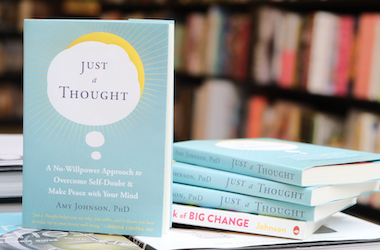Miller is fascinated with my ability to drive a car. 
How do you keep the car in the middle of your lane? Aren’t you scared pulling onto the highway with all those big trucks? How do you know where to go? You almost never get lost! Why does Daddy stop at yellow lights but you never do?
Trust me, my driving and navigation skills are not particularly impressive—this is just how it looks to a six year-old.
It looks very different–of course–to any experienced, adult driver.
To us, it doesn’t feel like we do these things at all. It’s more that we show up and let driving be done through us. We have to pay attention and make decisions along the way, of course. But driving is like many, many things in life—best done without a lot of intentional thinking.
Some tasks require high levels of intentional thought, constant vigilance and mental sharpness. Things like air traffic control, perhaps.
But I bet you grossly overestimate how many things fall into that category. We all do.
We’re so into our intellect, ourselves, using our head, how smart, independent, and in control we are, that we operate in life as if most things require the vigilance and intention of air traffic control.
We fall into the illusion that we’re pulling the strings, but most of life is done through us, not by us.
Here’s another example. I get questions like this most days of the week:
“How do I know when to eat? I’ve been using so-and-so’s method of noticing my hunger level, starting to eat when I’m a little hungry and stopping when I feel a little full, but it’s so hard. I just don’t always know when I’m hungry or when I’m full. I start thinking about what time it is, what I ate earlier, what time I’ll eat later…”
If you don’t overthink the natural act of eating when you’re hungry, this question is probably hard to follow. What do they mean ‘how do I know when I’m hungry?’ You just know!
But when someone has loads of thinking about this done-for-you process, it feels to them the way driving a car looks to six-year-old Miller.
It’s not inherently effortful or complicated. In fact, we’re designed to not have to devote mental energy to these decisions at all.
But when our minds try to manage what wants to happen naturally, we quickly feel overwhelmed and confused.
Eating and driving are just two of trillions of examples. There is so much more done through you than it seems.
For example, making life decisions. C’mon! you’re saying. Of course I make my own major life decisions!
But do you? You may enjoy some free will around the options and possibilities you zero in on, but you don’t put those options and possibilities in your own head. If you really look, I bet you can begin to see how decisions and choices are made through you far more than your mind cares to admit.
And, feeling better. Letting go, moving on, grieving, healing. Those happen by nature. The intelligence that heals your broken heart is the same intelligence that makes it possible for you to fall into the illusion that you did the healing.
And what about seeing something you don’t currently see? Learning, realizing, intuiting, solving problems? Your intellect does its part, but new thought isn’t created by you. It’s created through you.
It seems to me that if we set aside our illusions of control and our fascination with how smart and in charge we are, we see that almost all of life is more like driving a car than like air traffic control.
So, why does it matter?
You get to do less, for one. You can save your energy for other things.
You realize that you can fall back on and trust the intelligence running through you. The intelligence that powers all of life, always, is powering you too.
That intelligence is like a safety net.
As empowering as the thought “if it’s to be it’s up to me!” might feel at times, it can also be terrifying. Not realizing how much is working for you, through you, on your behalf, leads to enormous anxiety.
Enormous insecurity.
And it’s incredibly practical. You get better results when you know to get out of the way.
I’d rather ride in a car with a driver who is relaxed and present than a driver who is in their head, thinking about every adjustment of the wheel. I’d rather let my body lead me toward when and what to eat than let my busy mind make those choices.
The next time something looks complicated or confusing…the next time you feel the weight of the world on your shoulders, all eyes on you…ask yourself: Is my input really required as much as I think it is?
Am I overthinking this?
Might universal intelligence and wisdom (rather than my own little brain-contained intelligence) be taking the wheel?
Then, don’t answer that question yourself. An answer will show up. And that will be your proof.






